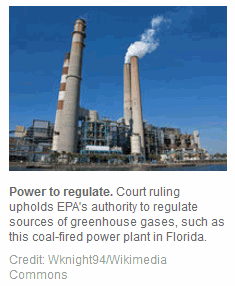|
News & Views item - July 2012 |
![]() U.S. Federal Appeals Court Sides with Environmental Protection Agency. (July
6, 2012)
U.S. Federal Appeals Court Sides with Environmental Protection Agency. (July
6, 2012)
The following report in today's issue of Science ought to gladden not only US environmentalists but all air breathing individuals inhabiting the planet.
A U.S. federal appeals court on 26 June ruled that the Environmental Protection Agency (EPA) relied on sound science in deciding that greenhouse gases potentially “endangered” public health and welfare.

In a unanimous decision, a three-judge panel rejected the states' and industry
groups' arguments that EPA had improperly “delegated” its scientific judgment on
greenhouse gases by relying on climate change assessments developed by the
Intergovernmental Panel on Climate Change, the U.S. Global Change Research
Program, and the National Research Council of the U.S. National Academies.
“EPA simply … sought out and reviewed existing scientific evidence to determine
whether a particular finding was warranted,” the judges wrote.
The ruling has its roots in a 2007 U.S. Supreme Court decision stating that EPA
could regulate carbon dioxide and other greenhouse gases under the Clean Air Act
if the agency demonstrated that they threatened public health. In 2009, EPA
issued rules limiting emissions from power plants, factories, and vehicles,
which drew dozens of legal challenges that were consolidated into the current
case.
And according to the original article by David Malakoff in ScienceInsider (June 26, 2012): "Discussions of climate science are sprinkled liberally throughout the 82-page opinion from the U.S. Court of Appeals for the District of Columbia Circuit. 'We begin with a brief primer on greenhouse gases,' judges David Sentelle, Judith Rogers, and David Tatel wrote in an opening section that outlines the science of climate change."
And as part of the court's refutation of the contention that the EPA "delegated its scientific judgment on green house gasses by relying on climate change assessments developed by the Intergovernmental Panel on Climate Change, the U.S. Global Change Research Program, and the National Research Council of the U.S. National Academies", the court wrote: "EPA is not required to re-prove the existence of the atom every time it approaches a scientific question," and told the litigants "This argument is little more than a semantic trick... EPA did not delegate, explicitly or otherwise, any decision-making to any of those entities. EPA simply did here what it and other decision makers often must do to make a science-based judgment: It sought out and reviewed existing scientific evidence to determine whether a particular finding was warranted. It makes no difference that much of the scientific evidence in large part consisted of 'syntheses' of individual studies and research. Even individual studies and research papers often synthesize past work in an area and then build upon it. This is how science works. EPA is not required to re-prove the existence of the atom every time it approaches a scientific question... EPA relied on a substantial record of empirical data and scientific evidence," they noted. But "EPA's failure to distill this ocean of evidence into a specific number at which greenhouse gases cause 'dangerous' climate change" is "not a sign of arbitrary or capricious decision-making."
Mr Malakoff concluded his report: "many industry groups and Republican political figures have vowed to reverse the decision, either in Congress or the courts. "The debate to address climate change should take place in the U.S. Congress and … not impose additional burdens on businesses," Jay Timmons, president of the National Association of Manufacturers, said in a statement.